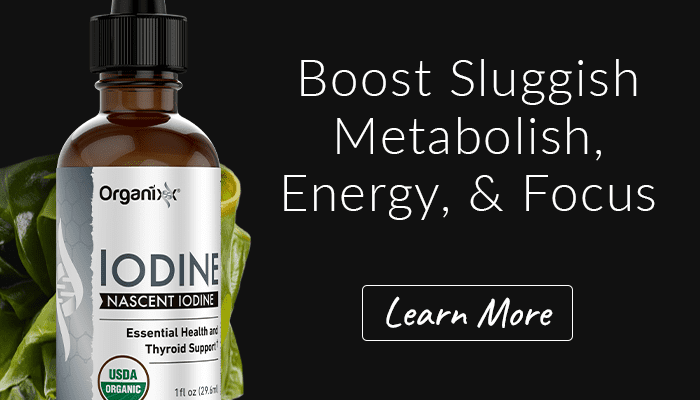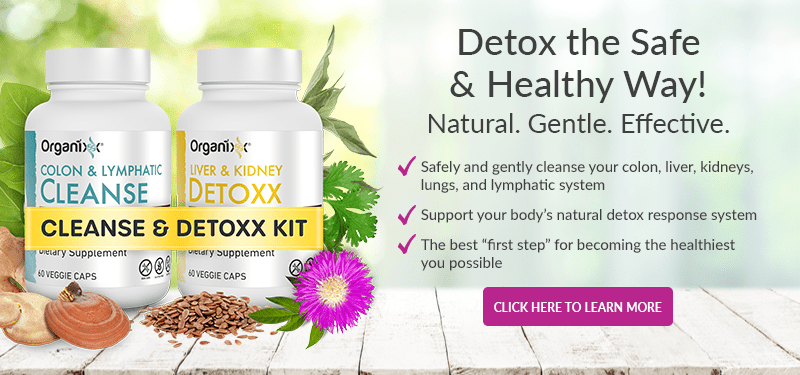Iodine is absolutely essential for every function in your body, including immune function, cardiovascular health, and metabolism. Of course, it’s most instrumental for the thyroid, since iodine is the foundation for thyroid hormone production.
According to the American Thyroid Association [1], close to half of the U.S. population suffers from lack of energy, temperature dysregulation, cognitive impairment, metabolic irregularity, and other conditions consistent with insufficient iodine intake.
The fact is that most of us need more iodine in our bodies. But what kind of iodine is right for you?
Iodine in Salt: Goiter Prevention and That’s About It
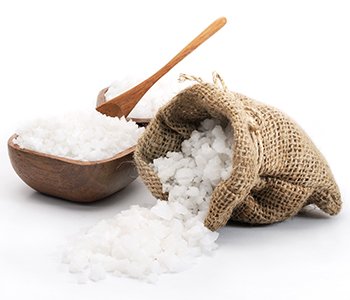 You may find it hard to believe that Americans and the rest of the world are so deficient in iodine. After all, you may think, don’t they put iodine in table salt?
You may find it hard to believe that Americans and the rest of the world are so deficient in iodine. After all, you may think, don’t they put iodine in table salt?
It’s true that most people in the U.S. and the world get most of their iodine through salt. This poses more than one challenge, however. The first issue with consuming iodine from table salt is that you will not get enough.
The addition of iodine to the U.S. salt supply started in the 1920s in response to a government health mandate. During that time, up to 40% of the population of the upper Midwest and Great Lakes region suffered from goiters and other thyroid diseases caused by extreme iodine deficiency [2]. [Note: a goiter is an enlarged thyroid gland that results in a swelling of the neck.]
Adding iodine to table salt did help with the goiter epidemic, but that was about it. Nonetheless, it became the foundation upon which the U.S. RDA, or Recommended Daily Allowance (now called the Recommended Daily Intake, or RDI [3]) was built. Today, the RDI for iodine is 150 mcg/day for an adult and 220 mcg/day for a pregnant woman. This amount may stop goiters, but it’s not enough for all the iodine needs of the body.
Toxins in “Iodized” Table Salt
The second issue with table salt is the amount of toxins that are in it. This concern was not present in the 1920s when the mandate began, but has become a reality in the age of cutting corners for safety and health in the name of big profit. While salt in the 1920s still came from the sea or mineral deposits, today’s “iodized salt” is actually a man-made form of sodium called sodium chloride (with iodide added to it).
In order to make salt white and help it last longer, most manufacturers use a bleaching process. This adds dangerous halides such as chlorine and bromide to the mix, which block the body’s absorption of iodine. In addition, other chemicals are often added to the salt, including manufactured iodide, sodium solo-co-aluminate, fluoride sodium bicarbonate, anti-caking agents, and aluminum derivatives [4].
If you are going to sprinkle salt on your food, most health experts suggest Himalayan pink salt or Celtic sea salt, which contains trace amounts of naturally produced iodine as well as other essential minerals.
Is There Iodine in Food?
Okay, so if you can’t rely on table salt to provide you with enough iodine… what about the iodine in food? Long before there were supplements, people the world over were eating enough of the right kind of foods to get the iodine they needed, correct?
If you look at the situation from a historical perspective, this is absolutely true. Foods such as seaweed, sea food, fish, eggs, spinach, dairy, strawberries, and cranberries [5] have a high iodine load when compared to other foods. In the past, eating these foods with iodine would ensure healthy amounts of iodine in the body.
Zoom in on the last 20 years or so, however, and you will see a completely different picture. The depletion of nutrients in the soil, as well as an increasing toxic load, has changed the amount of essential nutrients available in the foods we eat.
Here is a case in point: In a multi-decade study, researchers at the University of Texas analyzed the nutritional components of 43 different vegetables and fruits grown in the U.S. between 1950 and 1999. The report, published in the Journal of the America College of Nutrition [6], discovered “reliable declines” in essential vitamins and minerals in 1999 compared to 1950 samples.”
Potassium Iodine in Tablet Form
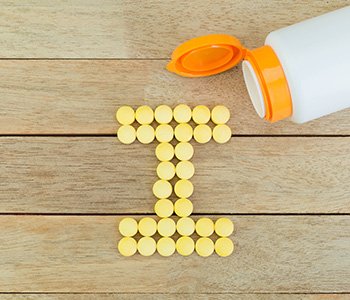 Iodine in tablet form comes in gel caps, pellets, and pills. For the most part, they are concentrates of dried kelp sources or similar substances. Molecularly, tablet form iodine is potassium iodide (KI), sodium iodide, molecular iodine, potassium iodate, sodium iodate or sodium iodine, or some combination of these.
Iodine in tablet form comes in gel caps, pellets, and pills. For the most part, they are concentrates of dried kelp sources or similar substances. Molecularly, tablet form iodine is potassium iodide (KI), sodium iodide, molecular iodine, potassium iodate, sodium iodate or sodium iodine, or some combination of these.
Potassium and sodium are often part of the picture because they act as carriers for iodine that the human body can safely absorb. Iodine in its natural state is unstable and even dangerous. Scientists discovered a while ago that combining potassium with iodine to form potassium iodide can create a more stable form, which can be absorbed by the body.
Molecular iodine, sometimes found in tablet form, is absorbed into the thyroid at a low rate but into breast tissue at a high rate. This makes molecular iodine a go-to for many who wish to help prevent breast-related conditions such as fibrocystic breast disease and breast cancer.
Researchers at Queen’s University Department of Surgery in Ontario, Canada, state in a report for the Canadian Journal of Surgery that “[the] results indicate the superiority of molecular iodine over iodides when treating fibrocystic breast disease [7].”
Research also shows that while potassium iodine cannot prevent radioactive iodine, or iodine-131, from being absorbed into the body, it can block its uptake into the thyroid immediately after high exposure. As the writers of Harvard Health, a publication of Harvard University, explain: “By flooding the body with non-radioactive iodine, the pills keep the gland from absorbing the radioactive iodine [8].”
KI is a very stable form of iodine, so by flooding the system with it right after exposure and over the next 24 hours, the thyroid gland can become “full” and will not take in any more iodine, radioactive or otherwise. This mechanism is why the World Health Organization [9] currently has protocols in place for “Iodine Prophylaxis” right after nuclear accidents. The main threats of events like Chernobyl and Fukushima is that when reactors leak, they will continue to spill radioactive Iodine-131 as well as cesium-137 into the environment for years after [10].
The downside regarding potassium iodine for everyday use is that only about 20% of this kind of iodine can be assimilated by the body.
Did you know that iodine is absolutely essential to every function in your body? Watch this video to learn how you can boost sluggish metabolism and energy.
Alcohol-Based vs Glycerin-Based Iodine
You may have noticed that some iodine supplements come in liquid form. These liquids are usually created by using either alcohol or glycerin.
The advantage of using a liquid for iodine transport is that it becomes more bioavailable to the body. Iodine in alcohol, however, is not the preferred method of liquid transport for several reasons.
First, most alcohol used for supplements are simple ethanol or grain alcohols, the same kind that the bartender puts in your favorite martini. Because of this, alcohol-based iodine may not be appropriate for young people, pets, those with high blood sugar, or those recovering from alcoholism.
In addition, almost all alcohols are made with genetically-modified corn and are not something you want to consume daily if you are striving for a healthy lifestyle [11].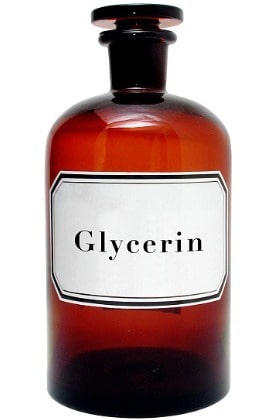
On the other hand, glycerin (also known as glycerine, glycerol, or glycerite) has many advantages – that is, if you can find the right kind. Most commercial glycerin-based products, like commercial soaps, are sourced through animal products. A better option is vegetable-based glycerin. And the best of all is organic, non-GMO glycerin that is not made from soy or corn.
Organically-derived, vegetable-based glycerin has many advantages for both external and internal use. Unlike alcohol, which is a drying agent, glycerin retains moisture and does not evaporate in air. Glycerin can be a great salve for burns and is an antiseptic as well. It won’t upset blood sugar levels and, as a boon, iodine in glycerin has a much longer, more stable shelf life.
Nascent Iodine
Nascent iodine is also known as atomic iodine, monatomic iodine, Atomidine, or colloidal iodine. The term “nascent” refers to iodine that has an incomplete number of electrons. This gives it an electrical charge, according to a report conducted by the non-profit Weston Price Foundation [12] and others.
Nascent iodine’s charge is what makes it uniquely special. Many forms of dietary iodine break down into iodide in the digestive tract. In this state, iodine-dependent organs like the thyroid and reproductive organs cannot use it. The charge of nascent iodine helps it stay intact and absorb quickly and thoroughly into the organs that need it most.
High-absorption is most helpful for the thyroid because nascent iodine can help this important gland maintain homeostasis. A balanced, properly-working thyroid ensures that that the body is operating with overall vitality, health, and strong immune function.
Which Iodine Supplement Is the Best for You?
Iodine is perhaps the most important nutrient for your body to ensure total health. For the health of your thyroid, and every organ, make sure you are getting enough highly-absorbable, organic, nascent iodine every day.
You may have deduced by now which form of iodine is the absolute best for day-to-day consumption. That’s right: a nascent iodine in a non-GMO, organic, and vegetable-based glycerin solution carrier [13]. You can get all of this in Organixx organic Iodine.
When your organs are working hard to detoxify, you want the purest form of iodine possible to help them work more efficiently. It only makes sense to use an organic form that’s totally natural and free of chemicals. Organixx Iodine is one of the only formulas that is USDA Certified Organic. It’s a pure, nascent form of iodine which your thyroid can use immediately.
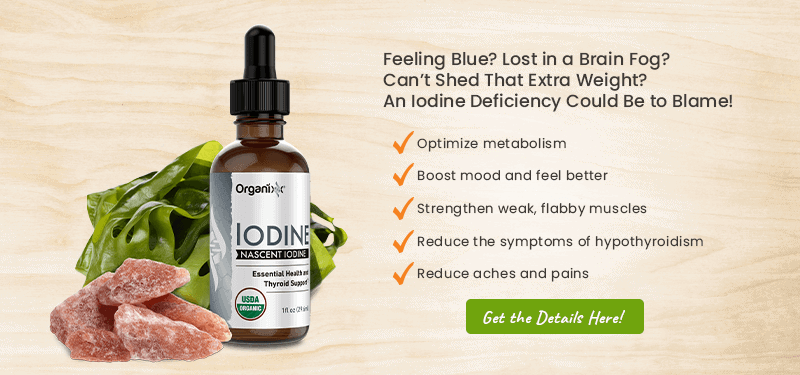
You have probably heard of the importance of essential minerals such as magnesium and selenium for staying healthy and vibrant at any age. But how much do you know about iodine?
The fact is that iodine is utilized for just about every function in your body. Yet many people are unaware of their body’s need for iodine, and that iodine deficiency has reached epidemic proportions worldwide.
10 Important Iodine Benefits
Here are 10 reasons why maintaining sufficient iodine levels is an absolute MUST for your health:
#1. Iodine Is Necessary for Metabolism and Thyroid Function
Metabolism is the act of converting food into substances your body can use. Iodine is an important part of this process. It helps the body break down food into nutrients via the thyroid gland and other mechanisms. Iodine is the literal “fuel” for the thyroid. Triiodothyronine (T3) and thyroxine (T4) are the main hormones that the thyroid produces.
For these hormones to be created, they need iodine. Good thyroid health also helps your body keep a steady heart rate, regulate temperature, improve digestion, and maintain a healthy weight [1].
#2. Iodine Helps Your Brain Stay Sharp
Iodine deficiency has been linked to cognitive decline in countless studies and is one of the “world’s most prevalent, yet easily preventable, cause[s] of brain damage,” according to the World Health Organization [2]. Iodine deficiency during pregnancy has been linked to autism in a recent University of Arizona study [3].
Furthermore, a 2013 Australian investigation published in the journal Frontiers in Neuroscience found that iodine supplementation improved the perceptual reasoning of slightly deficient children considerably [4].
#3. Iodine Protects the Body From Toxins
Fluoride, chlorine, and bromine are dangerous chemicals found in everything from new car interiors to tap water. They can also severely hinder thyroid function. Maintaining healthy iodine levels can block these “halide” chemicals from accumulating [5].
Iodine can also protect against xenoestrogens – “chemical mimics” – that can lead to reproductive conditions like ovarian cysts and uterine fibroids [6]. Some experts, such as author and natural health advocate Dr. Mark Sircus [7], point to the possibility that iodine may also help with mercury detoxification.
#4. Iodine Protects You From Radiation
In addition to flushing the dangerous “halides” mentioned above, iodine can also protect you from radiation exposure. It is a natural protectant from UV radiation for the eyes, according to a 2004 Austrian study [8].
Iodine supplementation can also be used to help individuals suffering from long-term radiation exposure. The effects of too much radiation can happen because of accidents, medical devices, and the radiation emitted by TSA scanners at airports.
A 2008 study [9] published in Radiation Research discovered that “terahertz radiation” like that found in airport x-ray scanners is linked to genetic mutation. Adequate amounts of iodine in the body is a must for anyone who travels a lot.
#5. Iodine Is a Natural Antiseptic
Maybe you remember that brownish-red solution your mom used to apply when you had a cut? For everything from cleaning wounds to purifying water, iodine is a sterilizing substance that can kill unhealthy organisms, bacteria and viruses.
A 2015 Iranian study found that a low-concentration iodine antiseptic used after oral surgery helped instigate first-stage wound healing in the surgery area, leading to faster recovery and less chance of infection [10].
#6. Iodine Is a Powerful Antioxidant
According to some experts [11], iodine may be as powerful in this regard as vitamin C! It can help reduce free radical damage that may lead to gene mutation and disease. It is a great boon for the immune system as it helps clean the blood of harmful pathogens.
A 2013 meta-analysis [12] published by the National Autonomous University of Mexico (UNAM) in the journal Thyroid found that iodine is “an antioxidant as well as an antiproliferative and differentiation agent” which can help clear up free radical damage in many organs of the body. It is also a powerful anti-inflammatory.
#7. Iodine Ensures Reproductive Health
Did you know that Japanese women have the lowest rates of breast cancer in the world? A 2003 report published in the journal Breast Cancer Research postulated that this could be a direct result of eating iodine- and selenium-rich seaweed, which is a staple in the Japanese diet [13].
Iodine is fuel for reproductive glands as well as the thyroid. Studies suggest that getting enough iodine can help prevent fibrocystic breast disease, preeclampsia, ovarian cancer, ovarian cysts, vaginitis, polycystic ovary syndrome, and even breast cancer. Enough iodine in the body is also one aspect of a healthy pregnancy [14].
#8. Iodine Helps Prevent Hair Loss
Besides protecting the skin and eyes from UV radiation, adequate levels of iodine can give your skin and hair a healthy glow. This is because iodine is involved in cellular rejuvenation [15]. Healthy iodine levels also help prevent hair loss because of the nutrients supplied to the thyroid gland [16]. Iodine in combination with other essential minerals such as iron, magnesium, and zinc can be a powerful internal tonic for thinning hair.
#9. Iodine Maintains Strong Teeth and Bones
Iodine assists in the production of strong teeth and bones by being a key player in calcium absorption. In fact, the connection between low iodine, low calcium absorption, and hypothyroidism has been known by researchers for at least the last hundred years [17].
One of the functions of the thyroid is the production of calcitonin, a hormone which helps balance blood calcium levels. This mechanism not only leads to maintain strong bones; it also plays a role in healthy functioning of the nervous system, heart and muscles.
#10. Iodine Helps Stabilize Your Mood
It is well known that low iodine levels can have an impact on the brain, as mentioned above. More recent research has also linked iodine deficiency to depression and anxiety. A 2004 study conducted by German researchers and published in the Journal of Psychiatry and Neuroscience [18] found a link between “alterations of thyroid-stimulating hormone (TSH) and mild cases of depression and anxiety.”
TSH is produced by the pituitary gland to signal the thyroid to produce more thyroid hormones. Fluctuations in TSH are often an indication that the thyroid is not getting enough iodine to do its job [19].
How Can You Get Enough Iodine?
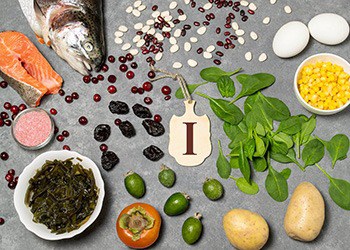
Odds are you are eating many whole foods, which already contain iodine. Among these are seaweed, high-quality seafood, eggs, strawberries, cranberries, dairy products, and dark green leafy vegetables. Sadly, because of poor soil quality and other factors in our toxic world, this may not be enough.
A study conducted by Royal North Shore Hospital in St. Leonards, Australia, found that 74% of healthy adults may not be getting adequate amounts of iodine through diet alone [20].
In addition, holistic health experts agree that relying on iodized table salt to get the right amount of iodine is not a wise option. This is because in order to produce commercial salt in the cheapest way possible, today’s manufacturers rely on harsh chemicals, which eventually wind up sprinkled on our dinner plates [21].
When it comes to iodine supplements, choose only the best.
Keep your standards high when it comes to iodine supplementation. Remember that iodine is the food of the thyroid, and the thyroid is the “command center” of all your hormones! You wouldn’t put junk into your mouth to feed your body, would you? Don’t put it in your thyroid either!
Iodine deficiency is widespread, not just in the U.S., but also globally. The World Health Organization estimates that roughly two billion people worldwide suffer from some form of iodine deficiency [22].
Don’t be another statistic. Stand out from the crowd by enjoying all the amazing health-supporting benefits that iodine can provide!
When your organs are working hard to detoxify, you want the purest form of iodine possible to help them work more efficiently. It only makes sense to use an organic form that’s totally natural and free of chemicals. Organixx Iodine is one of the only formulas that is USDA Certified Organic. It’s a pure, nascent form of iodine which your thyroid can use immediately.

Sleep is as crucial as food for keeping us alive and healthy, yet worldwide the typical adult does not get enough sleep. Sometimes it’s the simple things that keep us from a good night’s sleep, like an overactive brain or a neighbor’s barking dogs.
More complex problems that can disrupt sleep include chronic insomnia, snoring, and sleep apnea. This article will help you solve some of the simple problems that get in the way of a restful night’s sleep and explain why sleep is so important – particularly for the immune system.
Over 166,000 studies on sleep exist on the PubMed website, run by the National Institutes of Health. This plethora of sleep research convincingly demonstrates that lack of sleep and sleep disorders affect more people across the world than previously thought.
These conditions adversely impact health by increasing risk of disease, contributing to inflammatory conditions, creating lost time from work, increasing incidence of accidents due to lack of attention, and many other problems. One study stated that sleeping disorders even contributed to mortality [1]!
According to the American Sleep Association, 50-70 million American adults have a sleeping disorder [2]. A 2011 study found that 20% of French adults aged 25-45 slept 90 minutes less than they actually needed for optimal health [3].
The Importance of Sleep
 While we sleep, our bodies take time to rest up from the day’s activities and repair themselves.
While we sleep, our bodies take time to rest up from the day’s activities and repair themselves.
When a person does not sleep well, the effects can immediately be felt by a decline in overall well-being, performance, and cognitive function, as well as feeling sleepy or fatigued the next day.
Long term sleep loss can result in more serious health problems including increased risk for:
- cardiovascular disease
- hypertension
- inflammatory conditions
- pneumonia
- obesity
- diabetes
- impaired glucose tolerance
- disrupted hormonal function
- anxiety
- depression
- and even premature death
Have you ever thought about what’s going on in your body while you sleep? Here are just a few of the things that occur when you snooze:
- The brain is busy clearing away toxic by-products, processing information received during the day, and dumping unneeded information
- Heart rate, blood pressure, and breathing slow, body temperature drops, and digestion slows
- The muscles relax and blood supply increases
- Two systems of the body involved with stress, the hypothalamus–pituitary–adrenal axis (HPA axis) and the sympathetic nervous system (SNS), are down-regulated, and blood levels of stress related hormones, like cortisol and adrenaline, drop
- The liver moves from detoxification processes to renewing and rebuilding
- Dozens of hormones, proteins, and chemicals are delivered to target organs to build all of the different types of cells the body needs
- The immune system gets a recharge
The Impact of Sleep on Your Immune System
There is a delicate interplay between the immune system and sleep. The sleep we end up getting directly impacts how well the immune system functions.
First, a quick discussion on how the immune system works: the immune system is a collection of cells, tissues, and other molecules that works to protect the body from hundreds of different microbes and toxins.
The Immune System is Divided into Two General Types
#1: Innate Immunity – consisting of cells and proteins that are always present and which work quickly to mobilize and fight microbes as they are encountered, such as when bacteria enters a cut or abrasion in the skin.
#2: Adaptive Immunity – further divided into two types of immune responses:
(a) humoral immunity, mediated by antibodies created by B lymphocytes
(b) cell-mediated immunity, mediated by T lymphocytes.
Adaptive immunity is required to act against pathogens that can invade or overcome innate immune cells. This process takes a little longer than innate immunity, but once activated, adaptive immune cells work hard to neutralize or eliminate the invasion.
This branch of the immune system has memory cells that remember the aggressor and act specifically against it. This explains why there are some illnesses one can only get once in a lifetime, because afterwards these immune memory cells immediately recognize that threat and neutralize it, causing the body to become “immune” to that pathogen.
Studies have shown that even short-term loss of sleep can have a significant impact on how well the immune system functions. What appears to happen during periods of sleep loss is that the immune system triggers an increase in inflammatory markers.
Even a relatively modest restriction of sleep from eight hours to six hours per night for eight nights straight can effectively increase the level of pro-inflammatory cytokines (cell signalers) in the body, thus increasing inflammation [4].
Sleep also plays a major role in both adaptive and innate immune responses.
During nocturnal sleep, T cells increase production of interleukin-2 (IL-2), interleukin-12 (IL-12), and interferon-gamma (IFN-gamma). These are all cytokines involved in the adaptive immune response.
Nocturnal sleep also promotes an increase in natural killer (NK) cell activity, part of innate immunity, and induces the release of prolactin and growth hormone (GH) during the early part of the night [5].
NK cells roam the body looking for tumor cells, viruses, and other microbes. Prolactin and GH work to enhance the proliferation and differentiation of T cells and promote the activity of certain cytokines within the immune system.
It is easy to see, then, how even just one night of lost sleep can adversely impact the immune system. Fortunately, our bodies can bounce back from this “insult” relatively quickly unless sleep deprivation becomes chronic. This is important as long-term sleep deprivation can have catastrophic results for health.
The Psychoneuroimmunology Perspective
 The field of psychoneuroimmunology (PNI) is the study of the interplay between psychological processes, the nervous system, and the immune system. And it has some valuable insights regarding sleep and immunity.
The field of psychoneuroimmunology (PNI) is the study of the interplay between psychological processes, the nervous system, and the immune system. And it has some valuable insights regarding sleep and immunity.
The real value of PNI in sleep dysfunction is that it seeks to understand how sleep, stressful events, and negative emotions influence the immune system.
PNI researchers have discovered that pro-inflammatory cytokines contribute to both fatigue and sleep disturbances. One of the questions that PNI researchers have struggled with is what comes first?
The sleep disturbance which causes a general decline in immune health and triggers the release of pro-inflammatory cytokines, or other pro-inflammatory factors that impact the immune system which create the sleep disturbance.
These are interesting questions, but unfortunately PNI research has few answers for us. A 2015 clinical trial involving 123 older adults with insomnia had some interesting results, however…
Researchers found that Cognitive Behavioral Therapy (CBT) reduced levels of pro-inflammatory cytokines and gene expression. CBT involved multiple components of behavioral intervention by providing sleep education, strengthening associations between bed and sleep, and specific therapy for anxiety-provoking beliefs about sleep.
Also introduced in the trial was the discipline of tai chi, which reduced inflammatory responses. Researchers stated that the combination of CBT and tai chi reduced expression of genes encoding pro-inflammatory mediators [6].
In a comprehensive review of research, PNI scientists stated that stress-response pathways are often activated in those who experience insomnia, and that relaxation-based approaches such as tai chi, yoga, and mindfulness meditation help to calm these pathways, as well as having a beneficial effect on both adaptive and innate immune responses [7].
If you don’t currently have a meditative or relaxation practice, this is yet another compelling reason to implement one. In another article we explore 10 reasons why you may not be getting enough sleep and solutions to help you get more quality shut-eye.
If you’re having trouble sleeping, be sure to check out this article on the 5 best essential oils for sleep.
Magnesium deficiency is linked to stress, diabetes, heart disease, osteoporosis, chronic fatigue syndrome, depression, anxiety, trouble sleeping, sore muscles, migraines, and many more debilitating health conditions.
If your body needs magnesium, you want the most beneficial kind your body can actually absorb. Organixx Magnesium 7 gives you seven (7) of the very best, most bioavailable types of elemental magnesium available.
Click here for Kristen’s “Elvis” Banana, Chia, Bone Broth Power Smoothie recipe
Click here for the Berry Bliss Smoothie recipe
Click here for the Blueberry, Strawberry & Peach Smoothie recipe
Delicious Kale Apple Pear Spice Smoothie Recipe
Turmeric 3D from Organixx provides you one of the most “bioavailable” forms of turmeric due to its unique fermentation process. This means your body experiences the maximum benefits of the purest, most potent turmeric available!
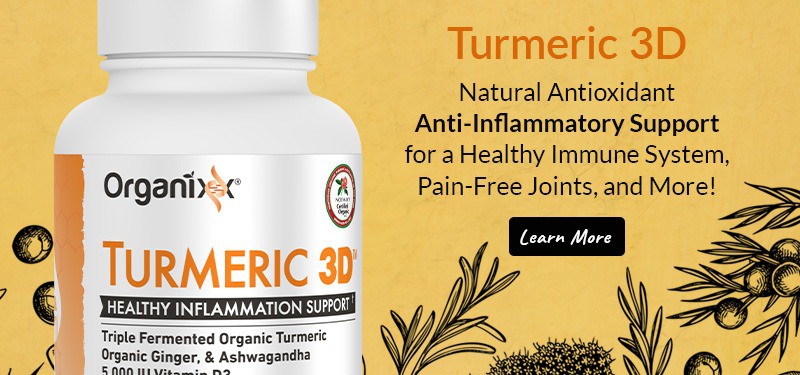
Watermelon, cucumber, lemon… oh my! We all know how good these wonderful, refreshing fruits and vegetables are for our health. But did you know that you can also put them in plain, filtered water to not only get some nutrients, but also stay well hydrated?
“Detox waters” are becoming more commonly used as an aid in detoxing the body naturally (which can aid with weight loss). If it helps us to drink more water, then it’s a trend we hope will stick around!
Water: A Fountain of Health
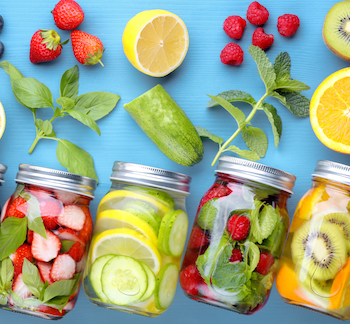 The best thing about infused water is that it contains, well, water.
The best thing about infused water is that it contains, well, water.
Staying hydrated is absolutely essential for pretty much every healthy function in your body, and for preventing disease as well. The reason for this is simple: our bodies are made up of over 60% water!
The importance of drinking enough water to stay hydrated (at least half our weight in ounces daily, say most experts) may seem like a no-brainer, but there are still plenty of people who haven’t made water their beverage of choice
If you’re still not convinced about the benefits of drinking plenty of water, here are just a few facts to consider:
- Water is needed to flush out toxins. Water is the liver and kidneys’ best friend. It helps reduce their burden by encouraging the flushing out of waste products.
- Water is vital for digestion. It helps dissolve fats and break down soluble fiber in the digestive system. According to research, when you are dehydrated, the colon will pull water from the stool to keep things moving, which increases the risk of constipation.
- Water is essential for cognitive function and mood. Even mild dehydration has been shown to have a negative impact on mood. And according to a 2012 study, “being dehydrated by just two percent impairs performance in tasks that require attention, psychomotor, and immediate memory skills…”Feeling cranky? Drink some water. Feeling frantic and can’t remember where you put your keys? You got it – hydrate your body into motion!
- Drinking water can eliminate a headache. This is because many headache conditions thrive when there is not enough water in the body. Dehydration can even trigger migraines, according to a report published in the Journal of Headache and Pain. In another study, drinking two cups of fresh water helped headache sufferers find relief in as little as half an hour.
- Water energizes us. In fact, feeling tired is one of the signs that you may be dehydrated. The next time you feel sluggish, chug at least 8 ounces of fresh water (or detox water) and watch your energy return. Hint: this also works if you are feeling hungry, since dehydration is often mistaken as hunger.
Other Health Benefits of Drinking Water
Drinking enough water is also essential for regulating body temperature, maintaining a healthy heart, adequate blood circulation, and smooth and supple skin, and helping you lose weight… the list goes on.
On the flip side, studies show that chronic dehydration can lead to chronic stress, higher inflammation, kidney stones, constipation, depression/anxiety disorders, and extreme fatigue.
Tips for Making Refreshing Flavored Water
Detox waters are designed to refresh, invigorate, and infuse the body with hydration and nutrients from the whole foods that are put within them.
They are also designed to help us drink more fresh, filtered water in general. They are not, however, watered-down versions of fruit punch or lemonade.
Be sure to avoid using condensed fruit juice, regular bottled fruit juice, sugar, or sugar substitutes in your detox water recipes. Not only can this spike your insulin levels, but it can also exacerbate dehydration since sugar can reduce the amount of fluid your body actually retains.
In addition, always make sure that the fruits and vegetables that go into your infused water are 100% organic and non-GMO and that they are washed thoroughly. This is especially important if you are using rinds, such as grapefruit and lemon, and skins such as cucumber.
Finally, for any of the recipes below, make sure your fruits and veggies are fresh and that they stay relatively cool, especially if you are using the same pitcher throughout the day. Produce tends to spoil easily once it’s been cut open, even if immersed in water all day.
5 Easy-to-Make Detox Water Recipes
While single-ingredient waters such as lemon water (water + lemon juice) and mint water (water + mint leaves) are always an option, these creative recipes are designed to kick your water up a notch.
This not only gives you a few extra energy-stimulating nutrients, but also circumvents the boredom of “plain old water,” which may prevent you from drinking enough throughout your day. After all, if something tastes great you’re far more likely to drink it on a daily basis!

Be sure to use fresh, filtered water and ice, and a sturdy glass pitcher. Never use bottled water for flavored waters as plastic containers often contain BPA and the phytochemicals and terpenes in fruits can cause this dangerous chemical to leach even more. Glass is always best for detox water.
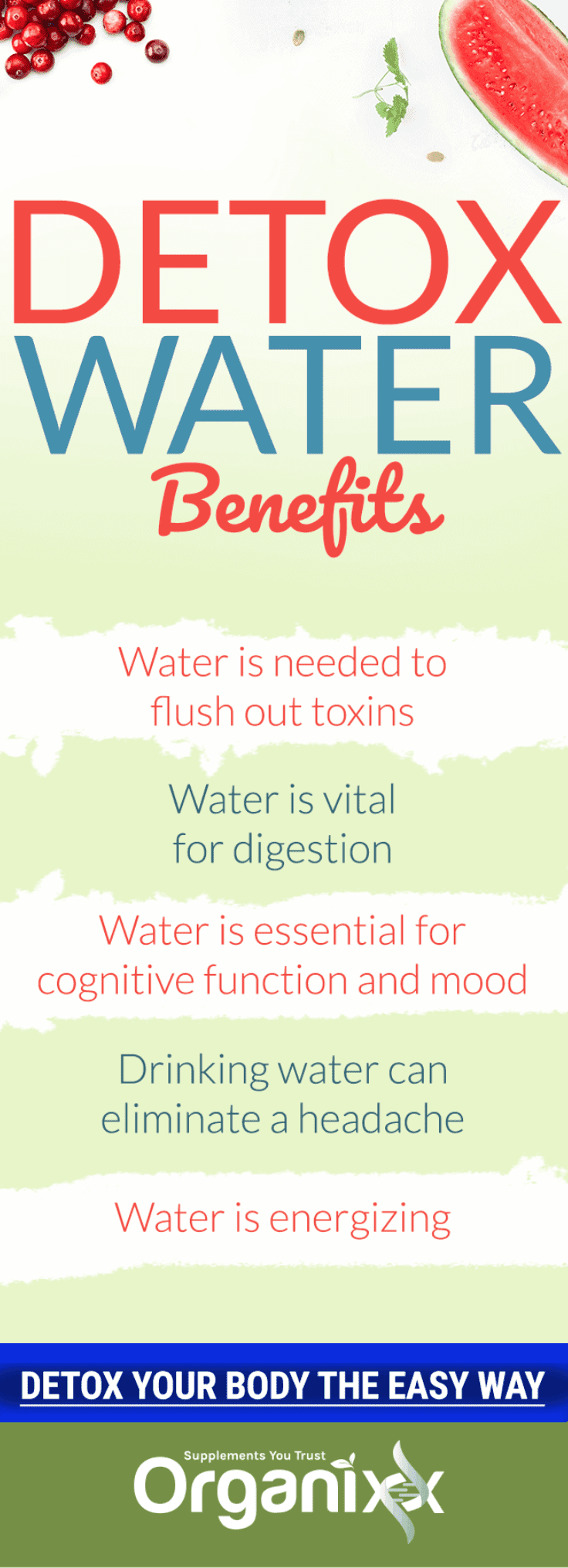
The prep time for each of these detox water recipes is less than five minutes and the instructions are all the same: chop, combine, enjoy!
#1: Cucumber-Mint-Basil Germ Buster
Cucumber is a super-hydrator and also contains silica, which can detoxify heavy metals. Mint can help digestion and uplift the mood. Finally, basil adds the germ-busting element to this savory-tasting water. This is a great water for winter, when close quarters and cold weather can lead to colds and flu.
- 1 cucumber with skin on, sliced
- ½ cup fresh mint sprigs or 3 drops food-grade peppermint essential oil
- ½ cup fresh basil or 3 drops food-grade basil essential oil (rosemary can also be used)
- 1 gallon fresh, filtered water
- Ice as needed
#2: Cranberry Kidney Cleanse
Proper hydration is the best medicine for the kidneys, but cranberries can stimulate kidney cleansing and help the kidneys perform at their best.
This one is great to consume in large amounts if you feel a urinary tract infection coming on, since cranberries contain a substance that can prevent bacteria from sticking to the walls of the bladder.
- 1/2 cup fresh cranberries, crushed
- 1 gallon fresh, filtered water
- Ice as needed
#3: Watermelon-Berry Delight
You can use strawberries, blueberries, raspberries, or blackberries in this recipe, or try all four! Along with the watermelon slices, this delightful recipe is a God-send if you have a sweet tooth but don’t want to indulge.
The natural fructose in both the berries and the watermelon will give you just the boost you need. Tip: You can also add a few sprigs of mint to this water for a little added refreshment.
- 3 cups watermelon cubes
- ½ pint berries
- 1 gallon fresh, filtered water
- Ice as needed
Detox waters are a delicious way to hydrate and cleanse your body. Feel rejuvenated with these refreshing detox water recipes designed to help wash away built-up toxins.
#4: Lemon Ginger Stagnation Buster
Have you been sitting at the computer all day and just need to get things moving again? Ginger has been shown to get the blood circulating and lemon, of course, is the ultimate detoxifier. Ginger also has beneficial anti-inflammatory properties and is a powerful source of the antioxidants that fight free radical damage in the body (e.g. aging!)
If you’re in a hurry, feel free to replace fresh lemons with 2-3 drops of food-grade lemon essential oil.
- 2 inches sliced ginger root (10-15 slices)
- 1 lemon, sliced with rind
- 1 gallon fresh, filtered water
- Ice as needed
#5: Spiced Apple Soother
This soother combines sliced Granny Smith apples, rich in vitamin A, folate, calcium, and magnesium, with cinnamon sticks, which are beneficial for the immune system as well as blood circulation. Try this without the ice or even in warm water for a mild tea.
- 1 unpeeled Granny Smith apple, sliced (or your favorite variety)
- 2 cinnamon sticks
- 1 gallon fresh, filtered water
- Ice as needed (optional)
Making and drinking detox waters has many benefits. They can increase your water consumption, provide you with a few more nutrients, and even get your “creative juices” flowing again in the kitchen (no pun intended).
The best part about them, however, is that they can help you actually enjoy the act of drinking water again!


